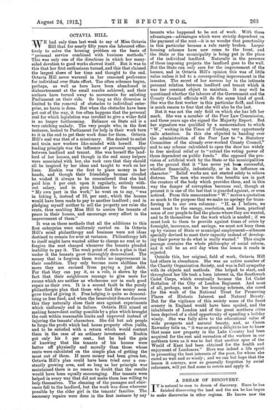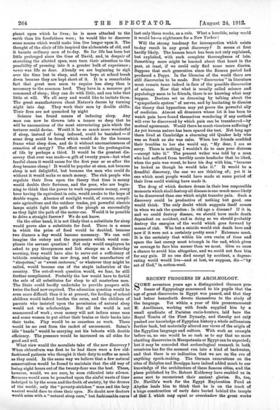A DREAM OF DISCOVERY.
IT is natural to man to dream of discovery. Since he has finished discovering the land and the sea he has begun to make discoveries in other regions. He knows now the
planet upon which he lives ; he is more attached to the earth than his forefathers were ; he would like to discover some means which would make him live longer upon it. The thought of the elixir of life inspired the alchemists of old, and it haunts ordinary men of to-day. So far life has been but little prolonged since the time of David, and, in despair of stretching the allotted span, men turn their attention to the possibility of pressing into it a greater bulk of experience ; never was life so dear. Already we are beginning to sigh over the time lost in sleep, and even boys at school break down because they are kept short of it. It is a remarkable fact that great men seem to require less sleep than is necessary to the common herd. They have in a measure got command of sleep ; they can do with little, and can take that little at will. We all envy and would like to imitate them. The great manufacturers cheat Nature's decree by turning night into day. They work their men by double shifts. Their fires are not quenched by night
Science has found means of inducing sleep. Any man can now be thrown into a trance so deep that he will be unconscious of the most excruciating pain which the torturer could devise. Would it be so much more wonderful if sleep, instead of being induced, could be banished — if some drug could be found which would do for the human frame what sleep does, and do it without unconsciousness of cessation of energy P The effect would be the prolongation of life by perhaps a third. It would be the greatest dis- covery that ever was made—a gift of twenty years—but what fearful chaos it would cause for the first year or so after the drug became cheap ! It would be popular at once, not because sleep is not delightful, but because the men who could do without it would make so much money. The rich people who regulate their lives upon the theory that time is money would double their fortunes, and the poor, who are begin- ning to think that the power to work represents money, every hour having its equivalent in coin, would awake to the hope of double wages. Absence of sunlight would, of course, compli- cate agriculture and the outdoor trades, yet powerful electric lamps might light the path of the plough as successfully as they light the path of the motor-car. Would it be possible to drive a straight furrow? We do not know.
On the other hand, it is not likely that a substitute for sleep would prove also a substitute for food. There is a sense in which the price of food would be doubled, because two dinners a day would become necessary. We can well imagine the outcry and the arguments which would com- plicate the servant question ! Not only would employers be asked to pay threepences and lick stamps on a Saturday morning, they would have also to serve out a sufficiency of tabloids containing the new drug, and the manufacture of " sleepettes," or " sweet restorers," or whatever they might be called, would become one of the staple industries of the country. The oat-of-work question would, we fear, be still further complicated. Probably the law would have to forbid the sale of all substitutes for sleep to all masterless men. The State could hardly undertake to provide paupers with twice the food now required. The education question would be even more difficult than it is at present, the feeding of school children would indeed burden the rates, and the children of parents who insisted upon the permission of natural sleep would not win scholarships. But all the world is not enamoured of work ; even money will not induce some men and some women to put either their brains or their backs into their tasks. Play would be as ceaseless as work. There would be no rest from the racket of amusement. Satan's idle "hands" would be carrying out his behests with double efficiency. The pressure would be increased on all sides for good and evil.
What view would the moralists take of the new discovery P When chloroform was first to be had there were a few old- fashioned patients who thought it their duty to suffer as much as they could. In the same way we believe that a few natural conservatives would be found to maintain that the old way of losing eight hours out of the twenty-four was the best. These, however, would, we are sure, be soon ridiculed into silence. Sermons would soon be preached upon the sinful waste of time indulged in by the scum and the froth of society, by the drones of the world ; only the " poverty-stricken " man and the lazy wastrel would dare to close their eyes. No doubt new doctors -would arise with a " natural sleep cure," but fashionable cures last only three weeks, as a rule. What a horrible, noisy world it would be—a nightmare for a New Yorker !
Will the strong tendency for introspection which exists to-day result in any great discovery ? It seems at first hardly likely. The human heart has been not only explained, but exploited, with such complete thoroughness of late. Something more might be learned about that heart in the past, at least, if we could only find some more diaries. Suppose that each generation since the Roman period had produced a Pepys. In the libraries of the world there are still discoveries to be made. But " discoveries " in literature must remain tame indeed in face of the possible discoveries of science. Now that what is usually called science and psychology seem to be friends, there is no knowing what may happen. Doctors set us dreaming by talking about the "sympathetic system" of nerves, and by hesitating to dismiss the theory that hypnotism may yet prove the powerful ally of medicine. Almost all dreamers whose lot it has been to watch pain have found themselves wondering if any method, will ever be discovered by which pain can be transferred—by mutual agreement. Would there be much vicarious suffering ? As yet human nature has been spared the test. Not long ago there lived at Cambridge a charming old Quaker lady who was as frank as she was calm. When her friends confided their troubles to her she would say, " My dear, I am so sorry. There is nothing I wouldn't do to ease your distress —except take it." The present writer was told by a man who had suffered from terribly acute headache that he iiked, when the pain was worst, to have his dog with him, "because he looked as though he would take it." It would be a dreadful discovery, the one we are thinking of ; yet it is one which most people would have made at some period of their lives could wishing have made it.
The drug of which doctors dream in their less responsible moments which shall destroy all disease is one much more likely to be discovered than one which might transfer pain. Such a discovery could be productive of nothing but good, one would think. The only doubt which suggests itself comes in when we ask the question : Is old age a disease ? If it is, and we could destroy disease, we should have made death dependent on accident, and in doing so we should probably destroy the energies of the world which goes forward by means of risk. Who but a suicide would risk death here and now if it were not a certainty pretty soon ? Extremes meet. It is the certainty that within his own realm of time and space the last enemy must triumph in the end, which gives ns courage to face him sooner than we must. Give us once a chance to avoid him altogether, and we could not face him for any gain. If no one died except by accident, a degene- rating world would live—and at last, we suppose, die—" by act of God," in cotton-wool.



































 Previous page
Previous page